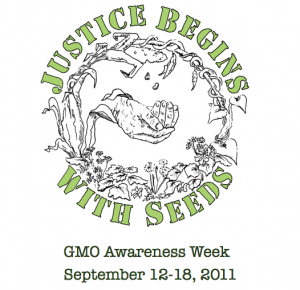
Bringing together an inspiring array of speakers including Vandana Shiva, Ignacio Chapela, Andrew Kimbrell, and Miguel Altieri, the Justice Begins with Seeds conference in San Francisco provided an important platform to reignite the struggle against the ongoing genetic modification of our food and food systems.
The California Biosafety Alliance, an organization that works to create “coalitions to address GMOs: the symbol of the corporate food regime”, organized the conference to address the many implications of genetically engineered food and build strategic alliances and deeper collaborations amongst diverse stakeholders for more widespread action throughout the state of California to shift away from the industrial food regime.
The Rainforest Action Network and Food & Water Watch ran a joint training at the conference entitled “Building a Powerful Political Campaign Against the Corporate Control of Seeds: Learning from Other Contexts”.
I was inspired by the words of Marcia Ishii-Eiteman of the Pesticide Action Network North America (PANNA), who said, “It’s time to reclaim our food system by challenging corporate control and building a food democracy.” RAN agrees that the growing the movement to challenge corporate agriculture is needed now more than ever as the consolidation of our food chain becomes more of a threat to food sovereignty and ecological integrity every day.
As Ignacio Chapela mentioned in his keynote, ADM recently went on public radio and asked us to “imagine if we had just one big farm to feed the whole world”. No, ADM, I can’t imagine what our food system would look like if we lost all semblance of genetic diversity, community supported agriculture, food democracy and food sovereignty….
On the brighter side, we’re seeing heightened government action: at least 40 countries now have anti-GMO laws (about a dozen of them in Africa), restrictions, prohibitions and/or labeling requirements. Moving beyond the political landscape of GMOs, we’re seeing other types of government leadership in the realm of corporate agriculture.
Take, for example, Australia. Despite intense lobbying by Malaysian palm oil industry leaders, Australian senators are pushing for the Aussie Parliament to pass a bill compelling the national food industry to increase the transparency in food labeling. Currently, palm oil in Australia hides under the label “vegetable oil,” and the controversial bill on the table would ensure that products containing rainforest-destroying palm oil were labeled as such.
Inspired by a growing resistance to the industrial food complex in all its ugly forms, from palm oil to genetically engineered foods, I am re-invigorated to up the anty on Cargill — one of the single most powerful symbols of all that is wrong with our food system. With your help, we can pressure Cargill to adopt supply chain safeguards so that America’s food supply may one day be fed by family and local community farms rather than industrial-scale plantations that destroy tropical rainforests, exacerbate climate change, push orangutans to extinction and displace Indigenous communities from their ancestral lands.